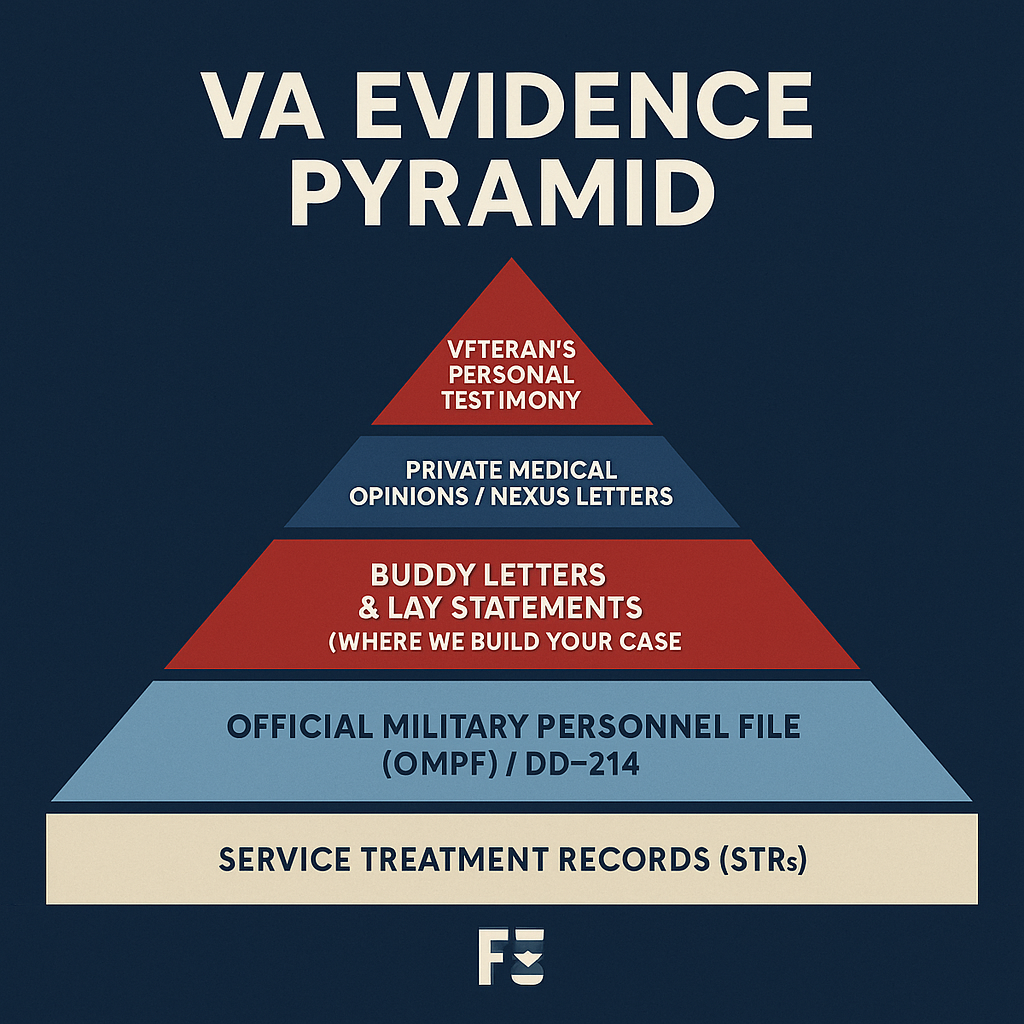Every 11 November the nation pauses to honor service, but action speaks louder than ceremony. Thousands of veterans still struggle to prove service-connected injuries, replace lost records, or locate comrades who can testify on their behalf. That’s where a professional investigative team like ours comes in. By blending open-source intelligence, national databases, and good old-fashioned fieldwork, we turn fragmented memories into admissible evidence—and we do it in weeks, not months.
Closing the Evidence Gap in VA Claims
 The Department of Veterans Affairs accepts lay evidence—better known as “buddy letters”—to corroborate incidents that never made it into official records [1]. Veterans submit these statements on VA Form 21-10210 [2] to verify everything from PTSD stressors to ankle injuries sustained during a midnight patrol, especially for conditions that aren’t on the VA’s presumptive conditions list and therefore require a direct, documented service connection [3]. Yet credible buddies can be hard to find decades after ETS. Our job is to track them down, verify their identity, and capture an affidavit that meets the VA’s evidentiary standard.
The Department of Veterans Affairs accepts lay evidence—better known as “buddy letters”—to corroborate incidents that never made it into official records [1]. Veterans submit these statements on VA Form 21-10210 [2] to verify everything from PTSD stressors to ankle injuries sustained during a midnight patrol, especially for conditions that aren’t on the VA’s presumptive conditions list and therefore require a direct, documented service connection [3]. Yet credible buddies can be hard to find decades after ETS. Our job is to track them down, verify their identity, and capture an affidavit that meets the VA’s evidentiary standard.
Case Vignette: The Lost Platoon Sergeant
A Vietnam veteran had spent 30 years trying to get a PTSD stressor service-connected. The only witness was his former platoon sergeant—the sole other survivor of an ambush outside Chu Lai. The sergeant’s trail went cold in the late 1980s. Using declassified unit rosters, property-tax records, and deep-web genealogy searches, we located him living quietly in rural Montana. After verifying service details, we gathered a detailed buddy letter that became the linchpin of the claim. Eight weeks later the VA awarded a 100 percent disability rating, unlocking life-changing health care and financial stability for the veteran and his family.
Re-Finding the Unit: Our Process for Buddy Letters
- Timeline mapping. We begin with any scrap of data—unit designations, deployment windows, even a nickname scribbled on an old C-ration box.
- Database targeting. We query Together We Served, VetFriends, and other veteran-run platforms that collectively house millions of member profiles [4].
- Deep-dive OSINT. Social-media aliases, local newspaper archives, and premium public-records engines confirm that “Sgt Smith” is the James R. Smith who bunked in Tent 4B.
- Sensitive outreach. Once we’ve verified identity and service, we make contact—always mindful of privacy and potential trauma.
- Drafting the letter. With the veteran’s consent, we team up with TheCivDiv—the YouTube channel demystifying VA evidence rules—to transform a memory into a rock-solid statement the VA can trust [6].
One credible witness can shave months off a claim and unlock back pay that changes a family’s trajectory. In cases where service records were lost (think the 1973 National Personnel Records Center fire), a buddy letter may be the only path forward [5].
Beyond Buddy Letters: A Full Spectrum of Veteran Support
- Record recovery. We file FOIA requests with the National Archives, branch medical commands, and state veterans agencies when standard channels stall.
- Benefit-fraud defense. Veterans sometimes face surveillance if the VA suspects malingering. We build counter-evidence—timestamped video, geolocation logs, expert medical opinions—to protect honest claimants.
- Fraud-and-scam mitigation. From “miracle” disability-review outfits to crypto cons, vets are prime targets. We trace digital footprints and help recover lost assets.
- Background & security consulting. Transitioning service members entering sensitive civilian roles rely on us for cyber-hygiene audits and pre-employment checks that safeguard their clearances.
- Resource navigation. When a client needs mental-health care, housing assistance, or financial counseling, we point them to vetted tools such as the Battle Buddy mobile app, which aggregates VA and nonprofit resources in one dashboard [7].
A Force Multiplier for Veteran Advocates
We partner closely with Veteran Service Officers (VSOs), accredited claims agents, and attorneys. Their calendars are packed; ours are built for investigative deep dives. By handling the time-intensive legwork—locating witnesses, authenticating records, securing notarized statements—we deliver verified evidence packages with a clear chain of custody. That makes our partners’ arguments stronger, their workflows smoother, and veterans’ outcomes better and faster [8].
Working with Us
Every engagement starts with a confidential strategy call. We outline the evidence gap, set milestones, and quote a flat investigative fee. Veterans receive real-time updates through our secure portal, and each artifact we gather—signed statements, DD-214s, medical files—carries a digital chain of custody for courtroom-level admissibility.
Veterans gave their all for our country. Helping them secure the benefits and camaraderie they deserve isn’t charity; it’s duty. If you—or a veteran you love—needs that last piece of proof, let’s find it together.
Reference List
- U.S. Department of Veterans Affairs. “Evidence Needed for Your Disability Claim.” VA.gov, 2025.
- U.S. Department of Veterans Affairs. “Lay/Witness Statement (VA Form 21-10210).” VA.gov, 2025.
- U.S. Department of Veterans Affairs. “Presumptive Conditions for Disability Compensation.” VA.gov, 2025.
- U.S. Department of Veterans Affairs News. “Buddy Finder Provides a Faster Method to Find Former Service Friends.” VA News, 2024.
- Military.com. “How to Find Your Old Military Buddies After You Get Out.” 2020.
- TheCivDiv. “Unlocking Your VA Claim with Buddy Letters: Tips, Tricks, and Secrets.” YouTube video, 2025.
- U.S. Department of Veterans Affairs News. “Battle Buddy: Your Direct Connection to Veteran Resources.” VA News, 2025.
- National Association of County Veteran Service Officers (NACVSO). “Role of the Veteran Service Officer in Claims Representation.” NACVSO.org, 2024.